Kunri
Kunri (Urdu: كُنرى), (Sindhi: ڪنري) is a tehsil and a town located in the Umarkot District, Sindh province in southern Pakistan.[1] It is located about 270 kilometres (170 mi) east of Karachi. It is the chilli capital of Asia. Kunri's red chilli is important to domestic and international markets.
Kunri
| |
|---|---|
Chut | |
| Country | |
| Province | |
| District | Umerkot District |
| Population (2017 Census) | |
| • Total | 218,493 |
| Time zone | UTC+5 (PST) |
| • Summer (DST) | PDT |
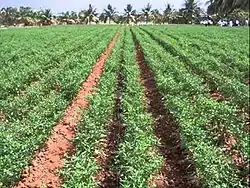
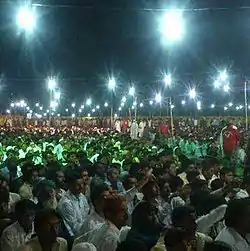
Demographics
It has a population of 218,493 (according to 2017 Census of Pakistan) that speaks many languages.
The population is composed mainly of Muslims. Local dervishes (waliullahs or walis) are prominent.
Small numbers of Christian, Ahmadis and Hindus (typically descendants of people who decided not to move to India during the independence of Pakistan) because of Kunri's Sufi and tolerant culture. Kunri has a population of Arain tribesmen from Punjab and the Sindhi Arain. Bhatti, Marwari, Pakhtuns, Baloch and other communities also live there.
Economy
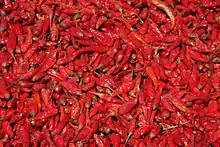
Kunri's economy is mostly based on agriculture. The region produces red chilies (approximately 88,000 acres around the Kunri area), cotton, sunflower, sugar cane, and Sindhri mangoes. The most popular crop is the red chili, which sustains the town. Kunri is the biggest red chili market in Pakistan. Cooking oil plants are located in Kunri, most of which provide employment only to needy people. The manufacture Sindhi embroidery such as Hurmacho (interlacing stitch), mirror work and applique quilts called rillies. Balochi Kharek embroidery is added to dresses made by locals.
Culture
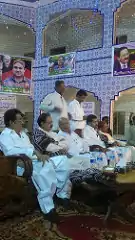
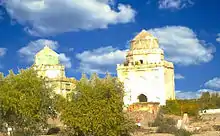
Culture is not caste-based. Talking back or replying to a bad comment is considered bad manners in Sindhi culture.
Jeeps are popular, because a jeep usually has four-wheel drive to enable access to nearby Thar desert.
Bibi Mithi Cemetery is a burial area, named after the prominent dervish matriarch of the local Hashmani Kazmi clan of Syeds. She had a black tongue tip, and could not lie. Her shrine is located in this graveyard. The other shrine is that of Shah Bilawal a few miles away.
Transport
Transport consists mostly of private cars, rickshaws, three-wheeled motorcycles and bicycles. Buses enable locals to travel to Karachi. Public transportation is limited. The only road joining Kunri to Mirpurkhas is in bad condition and requires constant repair.
A railway station is present.
Climate
Kunri is relatively cold in winter, around 3-12 Celsius. In summer the temperature reaches 46 Celsius, and dust storms are frequent. Average rainfall is about 100 millimeters. It rains heavily in the Monsoon season, sometimes inundating the lands and the unprotected chili crop as well as other cash crops.
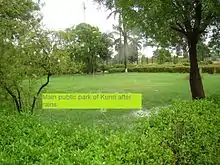
Nabisar Road
Nabisar Road is situated in Kunri Taluka. It is one of oldest towns in Pakistan. The Nabisar Road railway station was built in 1935.[2][3][4]
Notes
- Irwin 2010, p. 100.
- "Pakistan Railways" (PDF). Pakistan Railway.
Nabisar Road
- "Conspiracies against Gov to be Foiled". Dawn.
Nabisar Road
- "Nabisar Road". Dawn.
References
- D, Phyllis Irwin M.; Irwin, Phyllis (June 2010). Dr. Memsaab: Stories of a Medical Missionary Mom. AuthorHouse. ISBN 9781452025391.CS1 maint: ref=harv (link)
- Linda S. Walbridge. The Christians of Pakistan: the passion of Bishop John Joseph. Routledge. 1st edition. 19 September 2002. ISBN 978-0-7007-1656-2